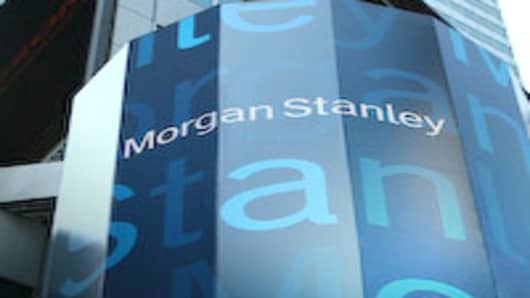Sue Craig has a great piece in the New York Times today about Morgan Stanley's recent travails.
"Its latest round of troubles began on Friday morning before the markets opened at 9:30 a.m. ET. Zero Hedge, a well-read and controversial financial blog, linked to a Bloomberg News article that noted Morgan’s credit-default swap spreads had been widening. The Zero Hedge post also directed readers to a previous Zero Hedge article that pegged Morgan Stanley’s net exposure to French banks at $39 billion, about $12 billion more than the bank’s current market capitalization, reigniting fears about its exposure.
It was a potent cocktail of information. The company’s stock opened down more than 3 percent, prompting a flood of calls to Morgan’s investor relations and press offices."
Morgan Stanley claims this $39 billion number is way off because it is gross exposure, which means that it doesn't take into account hedges and other positions that might diminish the effect of losses from a European catastrophe.
So what are those hedges? And what is the "net" exposure once they are taken in account?
Morgan Stanley won't say. It claims it needs to keep silent ahead of its earnings announcement later this month.
Instead, it points to analysis by outside researchers. Brad Hintz, who is a genuinely smart guy, says the net exposure is just $2 billion.
Should this reassure investors or creditors? I'm not so sure. Finding perfect hedges is a difficult business. It's possible Morgan Stanley has found a way to perfectly offset $37 billion of exposure to Europe's crisis. But it is not possible to evaluate this claim with any degree of certainty because we only have the company's word for it.
Actually, we don't even have their word. We have the word of outside analysts.
So let's be frank: Morgan Stanley's hedges may be perfect. Or they may not. We simply do not know what the positions are or who the counterparties are. Are they hedging with credit default swaps sold by Credit Agricole , a French bank with massive exposure to European sovereign debt? Or do they have some sort of synthetic position built from credits structured across a bunch of financial institutions?
Your guess is as good as mine. Or Brad Hintz's.
Right now, Morgan Stanley is asking us to trust its judgment. Late yesterday, shares rose by a double-digit amount. So maybe investors think Morgan Stanley has earned that trust.
Questions? Comments? Email us atNetNet@cnbc.com
Follow John on Twitter @ twitter.com/Carney
Follow NetNet on Twitter @ twitter.com/CNBCnetnet
Facebook us @ www.facebook.com/NetNetCNBC



